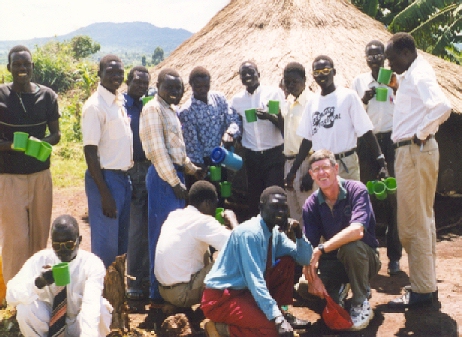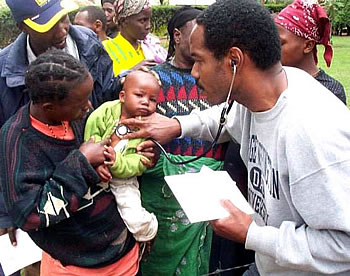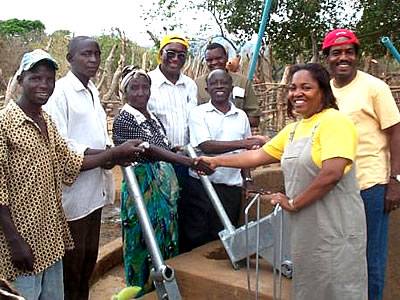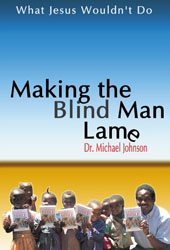
Probably not many more than 400-500 African-American cross-cultural missionaries exist among approximately 42 million African-Americans. While the Black church focuses upon the needs of the local congregations and community — understandably so — global missions is usually the "Great Omission." Although local ministry is essential, so the mandate to the Black church is the same as to any other part of Christ’s Body — to go to the ends of the earth to give everyone the opportunity to hear the Gospel. RMNi desires to help churches establish and pursue their global mission priorities.
The work was completed at Trinity Evangelical Divinity School, Deerfield, Illinois in 1998. You may also download and print the dissertation yourself by clicking here.

Some Recommended Theological Schools
You can help add to this list by contacting us
Trinity Evangelical Divinity School, Deerfield, IL (Evangelical Free Church, but professors are representative of various evangelical theological traditions), also other graduate schools.
Distance learning & extension school options
Columbia International University, Greenville, SC (Evangelical, non-denominational)
Reformed Theological Seminary (RTS), Jackson, MS (Reformed, obviously, and evangelical) Distance Learning at RTS
Covenant Theological Seminary, St. Louis, MO (Reformed, Evangelical)
Dallas Theological Seminary, Dallas, TX, (Evangelical, dispensational)
Southern Theological Seminary, Louisville, KY (Southern Baptist, Evangelical)
Moody Bible Institute (Evangelical, dispensational)
Undergrad and graduate programs available.
Wheaton College Graduate School
Third Millenium Ministries offers solid and free online theological resources.
Bryan College Master's Degree in Christian Studies
Other Schools, with an African American emphasis:
Missions Courses
Perspectives on the World Christian Movement
Our storeroom is designed for non-edibles. Things like spare car parts, essential power tools that I brag about, but never use and old fishing gear that I faithfully take out for my alternate decade outdoorsman activities. We are typical Americans. We collect stuff. In 32 years of marriage we have amassed a fortune of things which we can neither evaluate objectively, give away nor sell. We hope our kids want it, but they have no doubt begun their own collection of American treasures. The prospect of no future generations laying claim to this mountain of wealth made seeing the rats run through our treasures in the storeroom even more distressing.
He was barely alive, if you can call it life. The energy acquired by each breath was just enough to take the next one. His head bobbed back and forth as he breathed almost ready to detach from his wasted, skeleton like frame. He was the first in a line of 5 patients that day with whom I would share the cursed word ‘cancer'. The other 40 or 50 waiting outside would not hear that word today.
There was a man crying in my office and it made me feel very uncomfortable. He was not even on my list of patients to see and I really did not want to be bothered with him. Nevertheless, he sneaked in quietly after I had thought I had seen my last patient. Here he was, crying in my office. I should be used to it by now. After all, I have actually caused many people to cry. I have been charged with the ministry of telling a lot of people a lot of bad news. It has become so common for me to do this, that I can almost do it in my sleep. Come to think of it, I have done it in my sleep. I awaken in the middle of the night to the remembrance of the several people to whom I have given heart wrenching reports.

 Dr. Michael Johnson is an African American missionary surgeon, who served in Kenya with his wife Kay, from about 1990 until 2011. While continuing orphan care in Kenya, they now are located in the Philadelphia area and have begun ministry to ex-offenders, to those with unwanted pregnancies, and to people needing health care. Their website is: https://thosepeculiarjohnsons.org/. Dr. Johnson can write with a scalpel, as well as operate with one, excising and bringing healing.
Dr. Michael Johnson is an African American missionary surgeon, who served in Kenya with his wife Kay, from about 1990 until 2011. While continuing orphan care in Kenya, they now are located in the Philadelphia area and have begun ministry to ex-offenders, to those with unwanted pregnancies, and to people needing health care. Their website is: https://thosepeculiarjohnsons.org/. Dr. Johnson can write with a scalpel, as well as operate with one, excising and bringing healing.
Dr. Johnson presented a comprehensive view of his ministry and the African American church and missions at the African American Missions Seminar at Columbia International University in January 2008. View (and download) the PowerPoint presentation from that conference, which he kindly shared with us.
 The 2008 revised edition of his very insightful and provocative book Making the Blind Lame: What Jesus Wouldn't Do can be purchased at bookstores such as Amazon or by contacting Paula Kushman at World Gospel Mission, POB 948, Marion IN 46952-0948. You may also order by phone by calling 765-671-7206 Monday, Wednesdays and Fridays (or leave a message any day). The cost is $12.00 and shipping is about $3.00.
The 2008 revised edition of his very insightful and provocative book Making the Blind Lame: What Jesus Wouldn't Do can be purchased at bookstores such as Amazon or by contacting Paula Kushman at World Gospel Mission, POB 948, Marion IN 46952-0948. You may also order by phone by calling 765-671-7206 Monday, Wednesdays and Fridays (or leave a message any day). The cost is $12.00 and shipping is about $3.00.
We literally waded through the hundreds of patients to get to our work station in the Casualty Ward. In America we call it the Emergency Room. There were people standing in line, who had been there for several hours. Some were bandaged with crusted blood on their faces, clothing and dressings. Many of them had tattered and ragged clothing. The smell of some old wounds filled the air and added to the aura of despair. Some leaned against the walls, others lay on stretchers, or clustered together on crowded benches. This mass of men, women and children were coughing, gagging, grimacing, but no one was crying. Crying aloud is not part of this culture.
All of them look tired as though they had traveled on foot for a hundred miles without the benefit of food or water. This was not a major disaster scene. This was the usual beginning of the morning shift in the casualty department at Kenyatta National Hospital.
Many of them were waiting for the surgeon so, we had to move fast if we wanted to do some good today. I had the privilege of working with my son Elijah a few weeks prior to this, and now Kathrin Allen, a senior year medical student from George Washington University was working with me. She followed very closely behind. It would be easy to lose me in this chaotic crowd, except I was wearing a white coat. I could sense that this normal workday for me was going to be a challenge for her.
Our first patient had been beaten badly about the face and mouth, from which he suffered a broken jaw and a depressed skull fracture. He was awake and alert. He did not voice any complaint even though he had already waited four hours without wound care, pain medicine or intravenous fluid. He, like the other 200 plus people waiting in line, had learned to suppress the sensation of pain and await treatment as it came. An urgent call to the ear, nose and throat surgeons was answered five hours later and he was prepared for surgery later that afternoon. He was amongst the fortunate.
As we attended to the various cases of broken bones from car accidents, tumors of incredible sizes and wounds from bullets, and knives we began to feel the numbness that comes to anyone who sees masses of people who are hurting. In order to keep listening for pain, you must make sure that you feel or try to understand some of the pain. This can be numbing. We were awakened from this numbness by the buzz of an alarm bell that signaled d someone was needing urgent cardiopulmonary resuscitation (CPR). We moved quickly to the resuscitation room, without explaining to the patients we were attending. We were needed urgently.
Upon our arrival we met the medical officer who was managing a five year old girl who had quit breathing. He could not get the airway secure and the girl was close to death. After several attempts I was successful by God’s grace in securing the airway.
Before we could get too far, a mother brought in her 5 hour old premature, underweight, cold and lifeless baby. The infant was not breathing and had no heart beat. Remembering my Advanced Cardiac Life Support course which I had just taken while in the US, I gave two quick breaths by mouth to mouth and began chest compressions with my fingers. I was not optimistic that this infant was going to live, but knowing the parents were just outside the door, our team followed the full protocol. After 15 minutes of trying to regain a heartbeat, we gave up.
The staff stood together holding the mother and father’s hands and praying with them that God would be able to give them strength to bear this loss. “Why my baby?” was the father’s tormented cry as he fell to the floor. The mother sobbed loudly and the father rolled on the floor continuing to ask “why my baby?”
We held their hands, we looked them in the eyes and in the middle of the small resuscitation room, we tried to offer solace and compassion. We wrapped the baby in a cloth. We placed her on one side of the bed and prepared to try to answer their questions.
I watched Kathrin’s eyes fill with tears, but my attention was quickly diverted, by the sudden entrance of another anguished mother bursting through the doors. She ran in, throwing her child on the same bed with the body of the infant who had just died.
The staff responded quickly, and immediately began to move to make efforts at resuscitation, seemingly unaware that the body of the infant was just three feet away on the same bed. I could sense that in their urgency to care for this one child that was still breathing that they had emotionally distanced themselves from the one already dead. They had grown numb as I had. After all, we have a live one. Move over we need to save this life while we have a chance.
I exhorted the staff to move the dead baby from the table as we cared for the live child. After all, the mother and father could not bear the scene of their 6 hour old baby being pushed aside as if she were not only lifeless, but worthless. The staff complied, graciously moving the body to a more respectful site outside of the resuscitation room. We then proceeded to help the one who was yet alive.
We were able to successfully resuscitate three out of four pediatric cases that day. This was in the middle of managing the other myriad cases of trauma and less urgent surgical consultations.
The sense of ‘crisis’ continues to rise as the day goes on. There are too many patients, not enough physicians nor supplies. We leave at the end of our shift, knowing that we have done the best we could, given the limited resources available and the demands placed upon us. We have comforted those who have lost and given relief to those who are suffering. We have tried to model compassion and perseverance in the midst of overwhelming odds. I believe Jesus would have done just this. He would neither ignore the grief of those who mourn, nor just manage those who yet have a chance of life. The Eternal Savior is eternally optimistic. He always has time for those who grieve and yet takes time to offer hope to the living.
“Move over!” He bids the angels as He looks down on each of us…, “there is hope here, we’ve got a live one!”
Four articles from Dr. Michael Johnson, an African American missionary surgeon, serving in Kenya with his wife Kay, since 1990.
Dr. Michael Johnson has a powerful powerpoint presentation on Divine Dissatisfation.
Charisma magazine's Andy Butcher surveyed African American missions in February, 2000.
Many impediments to global missions are gone or greatly reduced. Here are 12 reasons to hope for a resurgence of Black global missions.
Can people who have never heard of Christ and have not rejected him be saved? Dr. Tony Evans' has developed the doctrine of "transdispensationalism," which answers in the affirmative. Go here for the background and a reply to Dr. Evans' views on this matter.

 Dr. Michael Johnson is an African American missionary surgeon, who served in Kenya with his wife Kay, from about 1990 until 2011. While continuing orphan care in Kenya, they now are located in the Philadelphia area and have begun ministry to ex-offenders, to those with unwanted pregnancies, and to people needing health care. Their website is: https://thosepeculiarjohnsons.org/. Dr. Johnson can write with a scalpel, as well as operate with one, excising and bringing healing.
Dr. Michael Johnson is an African American missionary surgeon, who served in Kenya with his wife Kay, from about 1990 until 2011. While continuing orphan care in Kenya, they now are located in the Philadelphia area and have begun ministry to ex-offenders, to those with unwanted pregnancies, and to people needing health care. Their website is: https://thosepeculiarjohnsons.org/. Dr. Johnson can write with a scalpel, as well as operate with one, excising and bringing healing.
Dr. Johnson presented a comprehensive view of his ministry and the African American church and missions at the African American Missions Seminar at Columbia International University in January 2008. View (and download) the PowerPoint presentation from that conference, which he kindly shared with us.
 The 2008 revised edition of his very insightful and provocative book Making the Blind Lame: What Jesus Wouldn't Do can be purchased at bookstores such as Amazon or by contacting Paula Kushman at World Gospel Mission, POB 948, Marion IN 46952-0948. You may also order by phone by calling 765-671-7206 Monday, Wednesdays and Fridays (or leave a message any day). The cost is $12.00 and shipping is about $3.00.
The 2008 revised edition of his very insightful and provocative book Making the Blind Lame: What Jesus Wouldn't Do can be purchased at bookstores such as Amazon or by contacting Paula Kushman at World Gospel Mission, POB 948, Marion IN 46952-0948. You may also order by phone by calling 765-671-7206 Monday, Wednesdays and Fridays (or leave a message any day). The cost is $12.00 and shipping is about $3.00.
Page 1 of 4